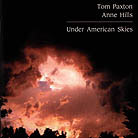October 2001
Based on the selection of songs on Under American Skies, "meaningful" to these singer-songwriters primarily means political, in the broad sense. I’m glad they see it that way, as I, too, often find recent singer-songwriter material overly self-indulgent. One can’t say that about Paxton’s "There Goes the Mountain," "Under American Skies" by Hills & Paxton, Paxton’s 1967 song "Clarissa Jones," Richard Farina’s 1964 "Birmingham Sunday" about the infamous 1963 bombing that killed four young black girls in their church, the great songwriter Malvina Reynolds’ 1964 "God Bless the Grass," and most of the others on this disc. Many readers will probably remember Gil Turner’s "Carry It On" (1964) and "Well, Well, Well" by Bob Gibson & Bob Camp just from their titles. The songs are nicely arranged, with Jon Carroll and Scott Petito on piano, Al Pettaway on guitar, Mark Schatz on bass, Monica Roach on cello, Jarry Marotta on percussion, and a moving opening verse of "Birmingham Sunday" sung by children at the Carole Robertson Center for Learning, in Chicago, reminiscent of "Happy Xmas (War Is Over)" by John & Yoko and the Plastic Ono Band with The Harlem Community Choir. The problem I have with Under American Skies -- and possibly some listeners will find it a virtue rather than a flaw -- is the heavy-handed approach these experienced performers take to their singing, and in some instances to their lyrics as well. "There goes the mountain/Father of fir trees/Home for the grizzlies/Under its snow," begins the album. The song laments the destruction of mountains by "the cruel engineer." In contrast with, for example, Joni Mitchell’s light performance of her "Big Yellow Taxi," on a similar theme, which allows the listener to find the lyrics’ power for him- or herself, Paxton and Hills sing "There Goes the Mountain" in a somber tone as if one might otherwise miss the point that destroying mountains is a bad thing. In the title song -- a by-now-stereotypical tale of a girl who grew up poor, so that "She learned to close down her heart" and "Like a wounded animal/She lashed out, mean," and who is later executed for murder -- each verse ends "Under American skies." Hills & Paxton sing it, and especially that last line each time it comes around, with gloom and doom and righteous indignation, as if we didn’t already know such things happen "even" in the United States, reinforcing the obvious rather than creating unique effects through singing technique. One gets the impression that they allowed nostalgia for a time when millions of young listeners greeted such pseudo-profundity with a collective "Wow!" to obscure the fact that the sixties and seventies are gone, for better or worse, and that folksinging has become simultaneously less relevant and more sophisticated, these perhaps being one and the same. Partly for this reason, the less politically and socially conscious songs on the CD -- "Follow That Road" and "And Lovin’ You" -- make for the most appealing tracks. Of course, other artists and intellectuals cannot claim to have done better. GO BACK TO: |
 Tom Paxton & Anne Hills - Under American Skies
Tom Paxton & Anne Hills - Under American Skies![[Reviewed on CD]](../format/regcd.gif) I have
a strong affection for Tom Paxton and was pleased to be able to see him perform a year ago
in a free outdoor concert in my area. For many years I have played "The Last Thing on
My Mind" and "I Can’t Help But Wonder Where I’m Bound." I was not
familiar with Anne Hills until hearing Under American Skies even though she is a
longtime recording artist, who has performed and recorded with Paxton over the years.
According to Appleseed Recordings, this new CD was inspired by a conversation between
Hills and Appleseed president Jim Musselman -- both lamented "the fading status of
meaningful songs written in the sixties and seventies."
I have
a strong affection for Tom Paxton and was pleased to be able to see him perform a year ago
in a free outdoor concert in my area. For many years I have played "The Last Thing on
My Mind" and "I Can’t Help But Wonder Where I’m Bound." I was not
familiar with Anne Hills until hearing Under American Skies even though she is a
longtime recording artist, who has performed and recorded with Paxton over the years.
According to Appleseed Recordings, this new CD was inspired by a conversation between
Hills and Appleseed president Jim Musselman -- both lamented "the fading status of
meaningful songs written in the sixties and seventies."